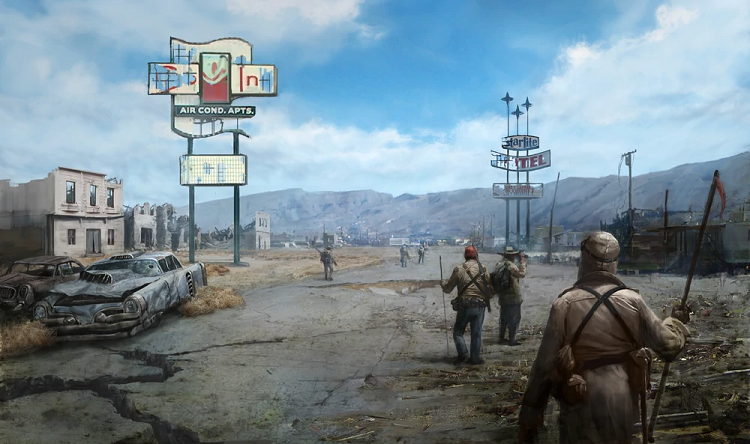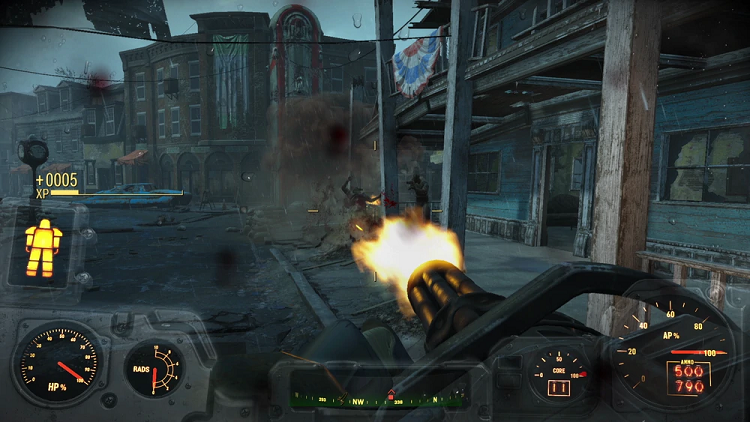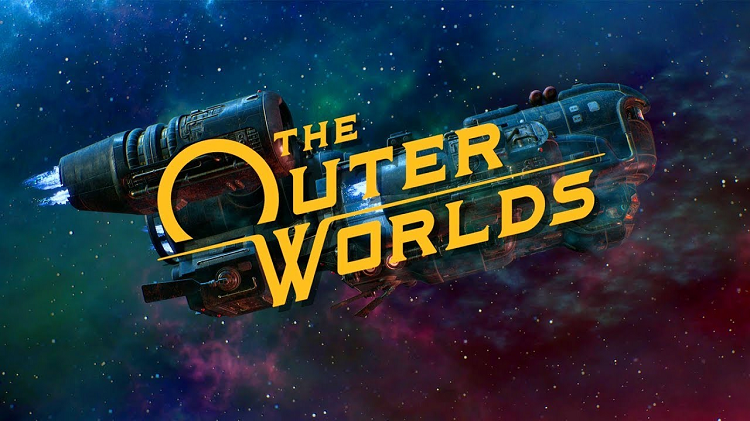- Fallout 4 Settlement Build Ideas – A Whole New Sanctuary - May 18, 2023
- Fallout New Vegas Come Fly With Me Guide - April 15, 2023
- Fallout 3 The Power of Atom Guide - April 2, 2023
Back in the year 2010, the gaming world received some very welcome news. After the success of Fallout 3, we were set to have a new game in the Fallout series, and upon its announcement at E3, we found out not only that Obsidian Entertainment would be at the helm but also that the game would be set in Las Vegas, Nevada.
Many were baffled that Bethesda would hand such a valuable IP out to a third party, but with former Interplay workers from the 1990s in Obsidian’s ranks, it seemed to be a good move.
However, they would have it all to do. They would have to create a full new Fallout game in just one and a half years, they would have to use Fallout 3’s frankly outdated engine, even for the time, and they would have to build on the mechanics, features, and writing present in Fallout 3, which was a tall order for even the most equipped studio out there.
However, they succeeded, creating a game that, despite its technical faults and graphical shortcomings, is arguably the best thing ever produced under the Fallout umbrella. This was great news in the short term for Bethesda, but it meant that Fallout 4 needed to be bigger, better, and had to compete with New Vegas, a title created by Fallout creators of old, for Fallout fans of all generations.
Bethesda set to work on this and created Fallout 4, an adventure that allowed players to explore the commonwealth, tracking down their lost child and causing maximum mayhem in the process. Each game has received a lot of praise, however, for very different reasons.
Fallout New Vegas is remembered fondly for its ability to offer deep roleplay, its incredible writing, open quest paths, and its incredible expansion of Fallout lore. Whereas Fallout 4 has been widely praised for its tight gunplay, building mechanics, and the later added survival mode.
However, you may be wondering which is best, what separates these two games, and whether both games are worth your time. Well, you have come to the right place.
In this guide, we intend to run through the core aspects of each game, discuss the similarities and differences between these post-apocalyptic titles, and truly assess which is best. So without further delay, here is Fallout New Vegas vs. Fallout 4 compared!
For those who live for the ‘too long, didn’t read‘ section, here it is. All the key differences between Fallout New Vegas and Fallout 4
Main Differences Between Fallout 4 vs New Vegas
The Main Differences Between Fallout 4 vs New Vegas are:
- Fallout 4 is a game that favors gunplay mechanics and a strong core gameplay loop, whereas Fallout New Vegas relies on its traditional RPG mechanics and strong writing to keep players engaged
- Fallout 4 trumps New Vegas not only due to being a more recent game but also due to a longer development cycle, a new game engine, and new hardware to work on
- Fallout New Vegas in terms of setting, lore, questlines, factions, and companions is far superior to that offered in Fallout 4
- Fallout New Vegas introduces some brilliant mechanics which vastly improved the experience offered in Fallout 3, whereas Fallout 4 strips some of these mechanics and features, replacing them with new ones which, while vastly different, are still great
- Fallout 4 offers a mixed bag with its DLC content, with Far Harbor being the clear highlight, whereas Fallout New Vegas offers some of the most cohesive DLC content ever produced in gaming, with all entries being phenomenal
- In terms of replay value, FNV is good for two/three playthroughs if you want to see all endings and experiment with the various factions. However, thanks to Fallout 4’s survival mode, settlements, radiant quests, and more. We would say it has more replay value
Writing/Narrative
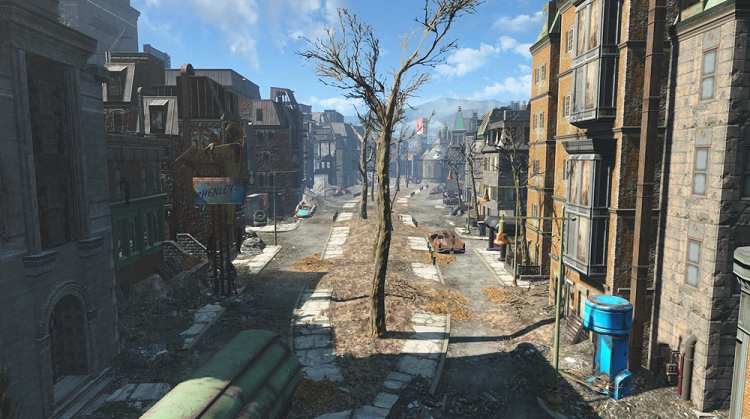
Fallout 4
So how does Fallout 4 get it wrong? Well, let me ask you this, did you ever care about Shaun. I mean, sure, we all inherently care and want to protect an innocent baby, but did you really have any emotional attachment to the kid? No, of course, you didn’t. A prologue of a game is created to reel you in, create an attachment, just look at how The Last of Us does this in such a short space of time.
However, you can’t do this without so much as a slither of dialogue. So, immediately the main questline gets put on the backburner. Then, in addition to this, the player has limited, hard to depict dialogue options, making it hard to roleplay, as you have no real choice of what you will come out with during an interaction.
This is due to the voice acting on offer in Fallout 4, but we aren’t too sure if this is a good addition to a game where the player projects themselves onto the character.
Then outside of that, the game fails in a number of key areas. The writing as a whole is rather poor. The Boogyman in the form of the Institute doesn’t live up to the billing; there is a sheer lack of main quests when compared to Fallout NV; the game introduces the ‘Yes Man’ equivalent right at the beginning of the game, which is not only the most boring option but also means that there is no grace period where you can get to know each faction like FNV’s act one.
The plot points like the memory den are all a little too convenient, and this all culminates in showcasing how lacking Fallout 4 is in the storytelling department.
Fallout New Vegas
Let’s begin with Fallout New Vegas. I won’t beat around the bush here; Fallout NV wins this category, hands down. Thanks to the incredible writing from Obsidian, which weaves in dark themes, jovial moments, humor, intrigue, mystery, and much more, it trumps the rather lackluster offering of Fallout 4.
The main storyline in FNV is a nuanced and wonderful thing. The first act is pretty much the same for all players, give or take a few variables.
However, when the player hunts down Benny and deals with them, the game opens up, with players given the freedom to side with anyone they like, build an army of allies, or equally decide to go it alone and slaughter every key faction around. It’s the freedom of choice and the branching quest paths that make FNV’s experience so special.
Then one can factor in smaller details like the skill checks for certain skills, or lack thereof. How your choices may affect your relationships with companions and block potential questlines, the fact that, no matter how much of a menace you were in act one, the end of this phase of the game acts as a clean slate. Plus, the lore.
We have to talk about how this game just nails the existing lore of the Fallout series, expands upon this superbly, and creates new entities that not only make sense within the world of Fallout but honor the lore of the 1990’s isometric titles.
One clear example is the fact that Obsidian makes Super Mutants three-dimensional characters rather than bumbling neanderthals, as seen in Fallout 3. Where Fallout 3 drops the ball in terms of building upon an existing universe, FNV picks it up and repairs any damage caused in a fantastic fashion.
Presentation
Fallout 4
Then with reference to Fallout 4’s graphical offerings, we have to say Bethesda has clearly won this battle, albeit due to the stipulations in place during Obsidian’s development cycle. The game is a generation ahead in terms of hardware, and the visuals show this.
The textures are, for the most part, very good, at least after updates as they initially weren’t on launch; the Commonwealth setting is a very interesting one that has more verticality than any other Fallout map, there are certain aspects of the interiors and exteriors that are ludicrously detailed.
We need only tell players to look up in the vault when you begin the game and look at the detail where most players won’t even look to understand that. Plus, the character models, animations, and dynamic weather effects are all superb. It may have an unfair advantage of sorts, but when compared to FNV, Fallout 4 is a much more aesthetic and stylish game; it’s no contest.
Fallout New Vegas
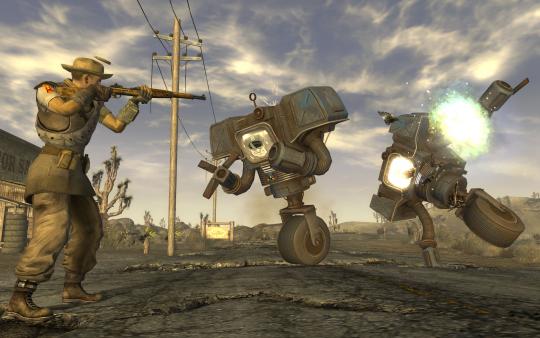
We won’t dwell on this too long as, ultimately, a lot of the blame cannot be placed on the developers here, as they did the best they could with very limited resources. On the positive side, the game does differentiate itself from Fallout 3’s heavy green filter, albeit with a heavy orange one.
The Nevada setting is great, offers striking points of interest, and offers a lot of fine details that tie in real-world assets quite nicely.
However, it is very hard to overlook outdated visuals that were outdated before the game even hit the shelves, so time hasn’t been kind to this title graphically speaking. Plus, the game had a lot of bugs and was prone to crashing as the abundance of features really tested the sixth-gen hardware and the obsolete game engine.
Audio/Score
Fallout 4
Then, in contrast, Fallout 4 would phone it in with regards to its score in some respects. While the game did add some new songs to the radio selection, a lot of the songs present in Fallout 3 made a return which just reeks of laziness. Then with regards to the score outside of the radio tracks, we have to say that it just seems devoid of any sort of direction.
The game doesn’t add suspense in areas, the ambient noise isn’t anything special, the themes that fill the space are unremarkable, and perhaps worst of all, the combat theme is obnoxiously loud. I mean, we get it; there are enemies around. This was something The Elder Scrolls IV Oblivion was guilty of, too, and it seems Bethesda Game Studios simply can’t help themselves.
Then with regards to the voice acting here, for the most part, this is delivered well, with inflections where they should be and emotion oozing through where appropriate.
However, the reductive nature of the voice acting, which is forced upon the player character, undoes a lot of this good work, and we can’t help but feel this time recording the player character’s line could have been used better. So FNV wins in this category in our book.
Fallout New Vegas
While FNV was limited in the visual department, when it came to audio and score, the team didn’t hold back at all. With focus first on the score, Obsidian decided to go with a more honky-tonk sort of theme. With a country and western playlist available via the customary in-game Pip-Boy radio.
Plus, the game also mixes this with a set of 1950’s jazz themes which are ideal for casino settings and wandering around the sandy Mojave wastes.
Then as for audio in general, we have to praise the voice acting within this title. With incredible performances from big names like Danny Trejo, Matthew Perry, and Kris Kristopherson, to name a few, this title really does all it can to pull players in and immerse them in the adventure unfolding before them. You might have to close your eyes to avoid the aged visuals, but you have to admit, it sounds excellent.
Gameplay/Core Mechanics
Fallout 4
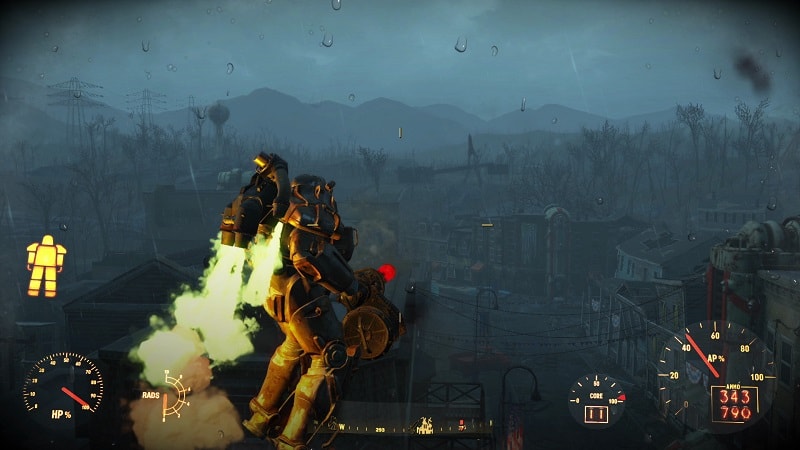
We could easily mirror a lot of what is stated above when talking about Fallout 4. However, we will avoid doing that as, aside from the survival mode, which honestly makes up for a lot of Fallout 4’s shortcomings, almost all of the things that Fallout 4 borrowed from FNV were implemented poorly. The factions and the companion systems are easy things to highlight.
So instead, let’s look at the new gameplay aspects brought into this game. Firstly, you have the scavenging system in Fallout 4. This is a mechanic that makes every single item in the Fallout universe a usable resource.
A simple Aluminium Can or a Desk Fan becomes a must-have item for your base, and this makes every area of the game a potential gold mine, which is genius in terms of providing a core gameplay loop.
Then on the subject of resources, the player will ultimately use those to build your settlements. In Fallout 4, players are able to create permanent bases where they could store items, grow food, get clean water, and make use of amenities like workbenches and the like.
One could argue that this is also somewhat of a stolen asset from the Big Mt DLC in FNV as the player can use the Think Tank as a permanent base of operations with a lot of the same offerings.
However, we would argue that Fallout 4 refines this and bulks out the features to make it an emergent experience that combines The Sims with wasteland living. It’s not for everyone, but it’s not forced on the player, and we think it’s a great feature to have.
Fallout 4 also introduces dynamic weather effects that are excellent additions, especially in survival mode, as rain can make players more susceptible to illness. Whereas a radiation storm will, as you would expect, add to your radiation stat and make you more vulnerable.
Then with regards to the amenities we mentioned before, the player is able to modify and craft armor, weapons, chems, food, Power Armor, and more. While FNV does offer this to an extent, the offerings in FO4 are more in line with that of The Elder Scrolls V Skyrim, which really adds to the overall experience.
However, despite these strong gameplay additions, this game is guilty of some really poor decisions, too—something which we can’t accredit to Fallout New Vegas. The most relevant example is the inclusion of radiant quests, which make a lot of the quests and experiences within this game feel like cookie-cutter quests.
Fallout 4 has a tendency to offer a one-size-fits-all approach to a lot of its gameplay choices in an attempt to get as many RPG and modern gamers onboard. However, in doing so, they really alienated a lot of the long-time Fallout fans and stripped a lot of the RPG aspects of the game, which the series has built its acclaim upon. All this considered, though, it is hard to argue that the modern and fluid gameplay of Fallout 4 cannot compete with FNv, so we think a tie is a fair result.
Fallout New Vegas
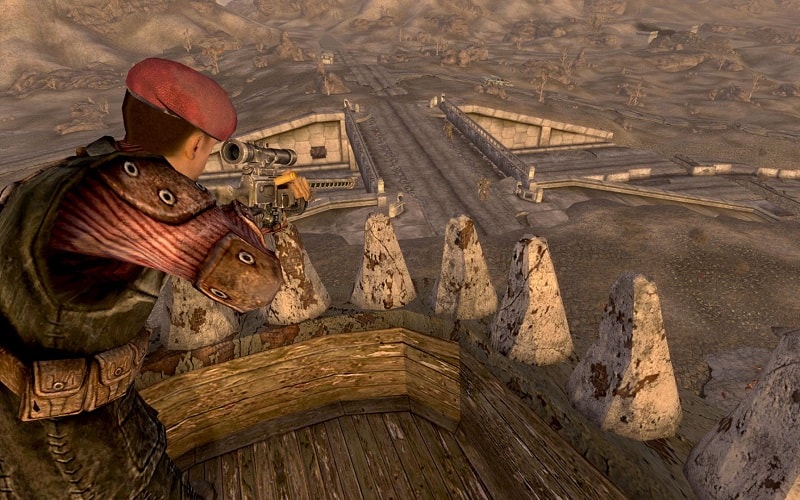
Now here comes the bulk of this comparative breakdown, the actual gameplay. It is quite hard to compare the two, as Fallout New Vegas, aside from small aspects which were changed, really is just a reskinned Fallout 3. However, we can highlight the best aspects of this title’s gameplay, as even with the limitations, the gameplay is still a lot of fun.
Firstly, we want to highlight the changes that the game made to Fallout 3’s core gameplay. FNV would introduce Iron Sights which would allow those who didn’t want to solely rely on VATS aiming to play and enjoy combat in real-time.
Then they would double down on the gunplay improvements with the addition of gun mods which could be added to each type of standard gun within the game. Both of these things allowed players to play this game in a new way and mix FPS and RPG elements as FO3 had intended years before.
Then the game would also improve various more administrative aspects of FO3’s experience. The players would be able to enjoy a higher level cap which would allow for thirty levels without the addition of DLC. Then as well as this, players would be granted access to one perk per level, which, while being much more enjoyable, allowed for more flexibility with character builds.
Then with regards to the way damage works in this game, FNV would toss out damage resistance, and in its place was the much more balanced damage threshold, which allowed for players to wear more varied armor selections and not just go for the highest number.
Then we have to mention the attention to detail in terms of character builds. Players had the freedom in FNV to play their own way and build genuinely balanced characters. If you wanted to be an idiot who uses brawn over brains always, you can, and you will have a distinctly different experience than that of, say, an intelligent build, for example.
Then players could also double down on this with the new, or should I say old, trait system. These are game perks and pitfalls doubled together to offer something good and bad for the player. Then, of course, there was the Wild Wasteland trait that made the game a very strange and bewildering experience at times. Overall, very welcome changes.
The game would also include a hardcore mode that would ask the player to juggle traditional survival mechanics along with the normal trials and tribulations of the Mojave. This was handled wonderfully and added replayability and a new perspective to this game.
DLC
Fallout 4
Then as for Fallout 4’s DLC, it’s a really mixed bag. We have to say that Far Harbor is a shining light in this DLC bundle and allows players to play through a storyline that is actually well-written and engaging, unlike the main storyline. This DLC offers a rich locale full of interesting characters and allows the player to put Nick Valentine in the spotlight, which is always a good thing.
However, the rest of the offerings are really lackluster. The Nuka World DLC is a decent novelty, if a little unremarkable, and the same goes for the Automatron DLC. Then all that’s left is additions to the settlement building, which ultimately feels like a Sims expansion pack, which is lazy, to say the least.
Fallout New Vegas
Then lastly, we want to discuss the DLC on offer. Fallout New Vegas, in my personal opinion, offers the best value for money DLC package ever produced in gaming. The stories and writing in each DLC are stunning. Each DLC is distinctly different, with new locales, rich characters, and interesting themes.
Plus, what isn’t credited enough about this DLC package is how each DLC subtly links and offers an overarching story, providing added value for players that are willing to hunt out all the added lore hidden away in the nooks and crannies. You can’t help but fall in love with each DLC on offer here.
Which is Better?
Overall, if I was going purely by personal opinion, I would say that Fallout New Vegas, despite its flaws and limitations, is by far the richer experience. If you are asking which title has the better story, quests, locations, characters, DLC, writing, character build options, and RPG elements.
I would say that there is absolutely no way that Fallout 4 can compete. It has moments where it shines in each of these areas, but FNV delivers consistently on all fronts. However, we simply cannot ignore that Fallout 4 is a much more modern and more fun game to actually play.
If you take the RPG aspect out of the equation and look at the visuals on offer, the setting provided, the tight gunplay, the ability to build, craft, and, of course, the very well-implemented survival mode. We have to say that Fallout 4 is a better experience in this regard.
So basically, it boils down to this. If you want a narrative-driven and rich RPG experience with nuance and charm, but one that you will have to endure crashes, poor visuals, and very primitive combat, FNV is your winner.
However, if you want a game that plays akin to an FPS shooter with tonnes of action, great gameplay and survival mechanics, and lots of scope for replayability, but an experience that narratively is a very hollow and tone-deaf one that alienates RPG players for the most part, then Fallout 4 is the way to go.
Best Alternatives
You might be wondering what other games are out there that would float your boat if you liked either of these games. Well, we won’t leave you in the dark. We are all about introducing gamers to new, enthralling experiences, so with that in mind, check out these great video game alternatives:
Fallout New Vegas Alternatives
- The Outer Worlds
- Pillars of Eternity
- Wasteland
- Disco Elysium
- Fallout 1+2
Fallout 4 Alternatives
- Prey
- The Elder Scrolls V Skyrim
- Fallout 3
- Deathloop
- DOOM
FAQs Section
Question: Did Bethesda Underpay Obsidian Entertainment?
Answer: It depends on how you look at it, we suppose. In a legal sense, Bethesda did nothing wrong. The stipulation in the contract was that FNV would have to achieve an aggregate score of 85% on Metacritic for the Obsidian team to receive a hefty bonus. However, mostly due to technical issues and problems beyond their own control, the game would fall just short of the mark of 84%.
So considering that this team produced what is arguably the best Fallout game ever, this seems a little harsh. However, it was rather poetic that The Outer Worlds, a game in the same vein as FNV, would receive an aggregate score of 85%. I guess they are all on the same Microsoft team now, so water under the bridge.
Question: Who Made The First Ever Fallout Game?
Answer: The first-ever game in the Fallout series was produced by one of the leading developers of the 1990’s era, Interplay; this game was very different from the modern Fallout series opting for an isometric RPG style. This style of game has seen a revival of late within the gaming industry, with games like Disco Elysium or Obsidian Entertainment’s Pillars of Eternity being prime examples of this.
Question: Is Fallout a Microsoft/Xbox Exclusive
Answer: At the moment, we just cannot say for sure. Xbox/Microsoft has acquired Zenimax Media, the parent company of Bethesda Game Studios. However, according to Phil Spencer, there are no immediate plans to make Bethesda games exclusive to Xbox, and they have honored timed exclusive deals with Sony like the one present for Deathloop.
However, we would say that this attitude will not last too long, and we would not be surprised if gaming fans will be forced to get an Xbox Series X/S to enjoy future Fallout titles.
Crawl Out From the Fallout!
As you can see from the extensive analysis above, despite my own personal opinion, there really are two schools of thought here, and each has merit. While Fallout New Vegas is a better-written game with more player choice, more opportunities for deep roleplay, and a lot more quests to enjoy.
Fallout 4 is a game that caters better to the modern gamer that enjoys action-packed FPS games, offers a much more aesthetically pleasing and detailed world, and also offers more reasons to replay after the credits roll. One will appeal to RPG fanatics, and the other will appeal more to gun-toting FPS lovers.
However, each game is fantastic in its own right, and we urge you to try them both. As Always, thanks for reading Wasteland Gamers!
Continue reading more Fallout game comparisons:


